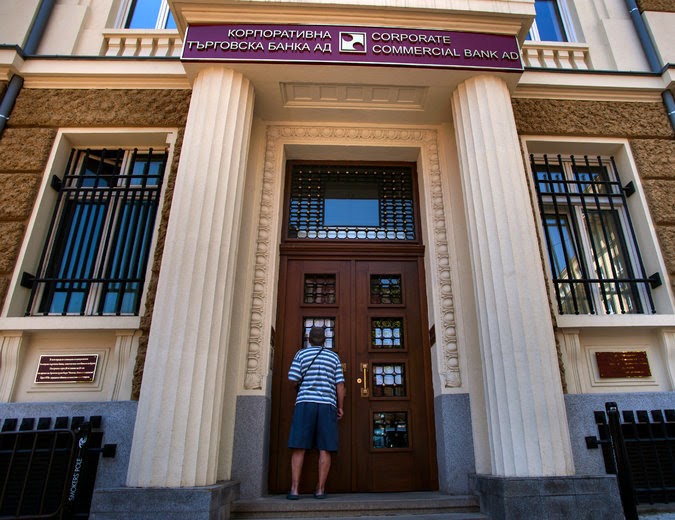Pressure is building on Bulgaria to deal with its worst banking crisis since the 1990s as the European Union and international investors have issued warnings about the fate of one of the country’s largest banks.
Bulgaria is struggling to find a solution for the ailing Corporate Commercial Bank, which has been closed since June after experiencing a run. On Friday, the European Commission urged Bulgaria to start repaying depositors as much as $2.5 billion that was insured by the state under European law.
In a letter to the Bulgarian authorities, the commission said it found the situation with the bank “very worrying” and warned that it might take steps to guarantee the application of the law — something analysts see as a veiled threat of legal action.
But on Monday, Parliament refused to back a budget amendment to start repaying the depositors. The move came in its last session before elections scheduled for Oct. 5. With a caretaker government presiding until then, there may be no quick fix for the lender, the country’s fourth largest.
The fallout from the banking crisis has so far been limited to Bulgaria. The country’s foreign-owned banks, which account for 70 percent of the market and include UniCredit of Italy and Raiffeisen Bank International of Austria, have not been affected. But the problems at K.T.B. and in Portugal, where the third-largest lender, Banco Espírito Santo, is to be split up in a rescue, serve as a reminder that parts of Europe’s financial system are still unstable in the aftermath of the Continent’s debt crisis.
The banking turmoil comes during a period of political instability in Bulgaria, a country of 7.3 million. The government of Prime Minister Plamen Oresharski resigned on July 23, the second cabinet to depart in less than 18 months. It lost parliamentary support after a poor showing by the governing Socialist Party in the European Parliament elections in May.
K.T.B. was forced to close on June 20 after customers, unnerved by news reports of dubious deals by the bank’s main shareholder, withdrew more than a fifth of deposits in a weeklong bank run. A subsequent audit by the Bulgarian National Bank, the central bank, revealed outsize exposure to companies linked to the shareholder, Tsvetan Vassilev, and missing documentation for more than two-thirds of the bank’s loans. Mr. Vassilev has repeatedly denied any wrongdoing.
The run on K.T.B. spread to First Investment Bank, the country’s third-largest financial institution, where panicked depositors withdrew the equivalent of nearly $550 million in a matter of hours on June 27. Unlike K.T.B., First Investment Bank remained open after assurances of support from the government. No other banks experienced runs or problems.
K.T.B.’s fate remains in limbo as officials continue to wrangle over whether the state should bail it out or find private investors to save it. The central bank said the lender could remain closed for up to six months, leaving about $3.8 billion out of depositors’ reach.
So far K.T.B.’s large shareholders — including Oman’s sovereign wealth fund, which holds a 30 percent stake — appear reluctant to provide cash to prop up the lender. The VTB Group, Russia’s second-largest bank, which owns about 9 percent of K.T.B., has also declined to provide liquidity.
To ease fears of a full-blown banking crisis akin to the one in 1996 that led to the bankruptcy of more than a dozen Bulgarian banks and months of hyperinflation, the Bulgarian authorities said they would seek to join a European Union safety-net program called the Single Supervisory Mechanism.
Bulgaria would be the first nation outside the 18-country eurozone to join the program, under which its banks would be overseen by the European Central Bank. The Single Supervisory Mechanism is not scheduled to go into effect until November.
The European Commission’s letter on Friday, signed by Jonathan Faull, director general of the Internal Market and Services Directorate, reminded the Bulgarian authorities that because of the country’s efforts to join the program, resolving the K.T.B. case had become even more important.
In the letter, which was leaked by Bulgarian news media and confirmed as authentic by a spokesman for the commission, Mr. Faull said that if no measures were taken, K.T.B. depositors could sue the state, “which would put Bulgaria at great financial risk.”
The next threshold for the embattled lender comes when its bond, with an original issue of $150 million, matures on Friday. Last week, Moody’s downgraded the bond, which is held mainly by European and American investors, to a notch above junk level after the bank missed an interest payment in July.
A group of K.T.B.’s bondholders are contemplating legal action against the state if the bond defaults.
“There has been no communication with the bank, and we are looking anxiously at Aug. 8,” an American bondholder, who is part of the group, said in an interview, speaking only on the condition of anonymity because of the continuing negotiations. “But we still believe a reasonable solution protecting all sides is the easiest way out, and we are ready to give the Bulgarian authorities time to come up with a plan so long as we are not kept in the dark.”
Local depositors have also threatened legal action. Vejdi Rashidov, a former Bulgarian minister of culture, who cannot withdraw any of the $1.7 million he has at K.T.B., said he had formed a committee of depositors to sue the Bulgarian state if the case was not resolved soon. According to Mr. Rashidov, more than 280 depositors have joined the committee since last week.
“If the bank doesn’t reopen, we will sue the state over all the moral, material and psychological damages this has created,” Mr. Rashidov said. “The case with the bank is a criminal one — someone has stolen our money.”
The New York times





No comments:
Post a Comment